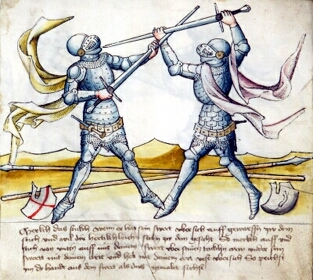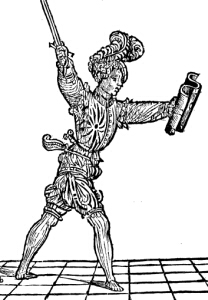
|
OUR MISSION As a confraternity of historical European martial arts schools, the Chivalric Fighting Arts Association (CFAA) has a threefold mission: to provide a climate of mutual support between member schools, to foster the ideals of historical fidelity to the ancient treatises and their cultural and ethical milieu, and to serve as a face and a contact point for individuals and institutions interested in Western martial arts and historical European martial arts. What Are
Western Martial Arts (WMA) or Historical European Martial Arts (HEMA)?
The focus of these studies is generally centered on individual martial skills (as opposed to strategic warfare), with a particular emphasis on the use of the sword in its various configurations. Significant strides have also been made in the understanding of unarmed fighting (such as wrestling), the use of shields, armor and other defensive weapons, polearms and mounted combat. This reconstruction is based on a theoretical/philological aspect as well as a practical one. The first consists in reading accurately and understanding the instruction contained in the extant martial-arts treatises, which begin appearing in the 14th century. The second consists in faithfully translating this understanding into body-mechanics, weapon in hand, first through drills, then progressively into free-fencing. Naturally, this study also entails an accurate understanding of the cultural and historical context in which these arts flourished and were employed. Why CFAA? The birth and growth of the WMA/HEMA movement has been spontaneous, with several unrelated groups and individuals applying themselves first to the books, then to the sword in several corners of the world. The Internet brought many of these groups and individuals into contact, and there has been a large amount of sharing of resources and ideas as a consequence. However, it has also become apparent that not all groups share the same vision and philosophy. CFAA would like to be the home for like-minded groups who share these basic points:
Providing Mutual Support Between Constituent Schools The reconstruction of ancient European martial arts relies heavily on written material, consisting of ancient primary sources as well as recent and ongoing studies. The ethical sharing of this material--with professional-level respect for ownership, authorship and copyright--is among the benefits that CFAA-affiliated schools will enjoy. Along the same lines, and if desired, CFAA member schools can assist one-another in curriculum development. The current roster of affiliated organizations boasts a near-universal array of historical martial arts expertise, and CFAA will encourage sharing this material among member schools. Also, as a confraternity, CFAA will provide member schools with support resolving internal and external issues regarding community politics, so that our arts may be enjoyed as much as possible in a climate of chivalry, scholarship and mutual respect. Fostering the Ideals of Fidelity to the Historic Treaties, Honorable Behavior, and Study of Our Arts within Their Cultural and Ethical Milieus
To our member schools, the texts are the single most relevant and authoritative word on the arts we strive to reconstruct. Therefore, member schools are encouraged to apply themselves to these books with a high level of philological passion--a passion that has, in the space of a few short decades, brought to light so much reliable information about how our ancestors fought. Equally as important is the respect for the spirit of chivalry and honorable behavior that were part of the ethical milieu in which our arts blossomed. Sure, chivalry and honor may have been idealized more in thought than in deed in centuries past, but we choose to take our example from the positive side of this equation. This includes favoring the scientific process of scholarship over the stubbornness of ego, healthy emulation to petty rivalry, acknowledgment of your instructor over teaching his labor as your own, and frankness and openness over squabbling and needless politicking. Serving
as a Consistent Face and a Reliable Contact Point for Individuals
and Organizations Inquiring about Our Arts A producer from the History Channel is on a fact-finding mission on historical European martial arts. An individual is looking for a group to train with. A college history program is looking for a reliably-accurate demonstration of a medieval dueling art. CFAA answers the question: Who would you rather these groups or individual find and contact? As a visible organization comprising some of the world's most prominent historical martial arts schools, CFAA wants to offer a consistent face and a reliable contact point for the arts we represent. Its membership includes researchers of note, professional scholars, published authors, heads of successful, International-level schools, as well as a collective expertise in more than five languages.
|
©2012
The Chivalric Fighting Arts Association - All Rights Reserved
 The
expressions "Western martial arts" (WMA) or "historical
European martial arts" (HEMA) denote the martial or fighting
arts endemic of Europe, with a special concentration on the middle
ages, the Renaissance, and the early modern periods. A scholarly
reconstruction of these arts through extant period treatises has
been the main focus of the International WMA/HEMA community, especially
in the last twenty years.
The
expressions "Western martial arts" (WMA) or "historical
European martial arts" (HEMA) denote the martial or fighting
arts endemic of Europe, with a special concentration on the middle
ages, the Renaissance, and the early modern periods. A scholarly
reconstruction of these arts through extant period treatises has
been the main focus of the International WMA/HEMA community, especially
in the last twenty years.  Although
CFAA respects other approaches to the study of historical martial
arts, the common philosophy of our member schools centers on fidelity
to the ancient texts, as well as to the spirit of chivalry and ethics
in which such treatises were conceived. One of the important goals
of CFAA is therefore that of keeping these ideals alive in the study
of our arts.
Although
CFAA respects other approaches to the study of historical martial
arts, the common philosophy of our member schools centers on fidelity
to the ancient texts, as well as to the spirit of chivalry and ethics
in which such treatises were conceived. One of the important goals
of CFAA is therefore that of keeping these ideals alive in the study
of our arts.